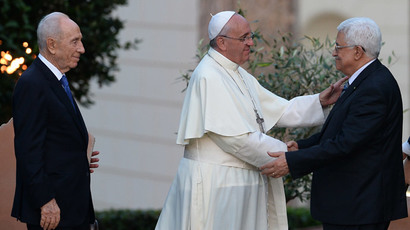Israel pushing law to allow force-feeding of Palestinian hunger strikers

The Israeli prime minister is pushing for the approval of a bill that will allow doctors to force-feed up to 120 Palestinian prisoners. Inmates are hunger striking in protest of their indefinite detention and say they are ready to die for their cause.
Israeli doctors refuse to force-feed Palestinian prisoners, despite govt pressure
Although the bill is opposed by the Israeli Medical Association on the grounds it is a violation of medical ethics, the Knesset voted for the legislation to be sent to a committee. The measure would allow a judge to enact force-feeding if he or she thinks the detainee’s life might be in danger.
Between 100 and 120 inmates are currently participating in the
hunger strike to protest their indefinite detention without any
charges.
Around 70 of the strikers are receiving medical attention as
their health has significantly deteriorated through the course of
the strike. The protesters want the Israeli practice of
administrative detention to be abolished as it allows for the
indefinite detention of an individual for renewable, six-month
terms without charges.
Detainees wrote a letter to the Palestinian Prisoners’ Club
detailing their treatment, which was obtained by Haaretz. They
claim the medical professionals treating the 70 strikers in
hospital are cooperating with the prisons, alleging some
detainees were chained to their hospital beds.
“The nurses, who are supposed to be angels of mercy, come
into our rooms with food to break our spirits, but we will not
give up until we accomplish our goal, and we are willing to die
for it,” the detainees wrote. “Each one of us has
already written his will, and we have sworn that there is no way
back.”
Qadoura Fares, chairman of the Palestinian Prisoners Club said that if the new legislation passes, it will not deter prisoners from striking. He added that forced feeding could kill prisoners, referencing the deaths of two Palestinian prisoners in 1980.

The UN has intervened and called for all of the inmates held under administrative detention to either be released or charged.
“The secretary-general is concerned about reports regarding the deteriorating health of Palestinian administrative detainees who have been on hunger strike for over a month,” UN Chief Ban Ki-moon’s spokesman Stephane Dujarric said in a statement, urging for the inmates to be released or charged without delay. The United Nations human rights office condemns the practice of force-feeding and classifies it as a form of torture.
The Israeli government, however, argues otherwise. Last week Prime Minister Benjamin Netanyahu said he was confident that force feeding would be instated to curtail the crisis, citing the US government’s use of the technique in Guantanamo Bay on striking detainees. Netanyahu is acting on the recommendations of security officials who have argued that negotiating with the strikers would only open the door to more hunger strikes in Israeli prisons.
“We want to give the government more tools. You can’t have a situation where prisoners who are in jail for a very good reason will use the threat of a hunger strike to receive a ‘get out of jail free’ card,” said an anonymous official familiar with the matter to the Bellingham Herald.
Last month the US saw its first Court ruling, calling for a halt to force feeding at Guantanamo Bay. Judge Gladys Kessler of the US district court for the District of Columbia suspended enteral feeding on inmate Abu Wa'el Dhiab. However, she ruled the practice be resumed a week later because the inmate’s life was in danger.
The US government says the practice is only employed at Guantanamo when prisoners are at risk of dying.














